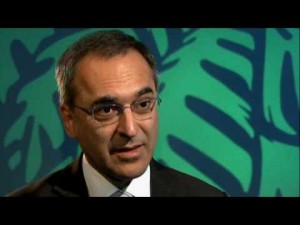Putting a price on the real value of nature (Pavan Sukdev)
Interview with Pavan Sukdev / Yale Environment 360 / January 2012
 Economist Pavan Sukdev led the international study into the Economics of Ecosystems and Biodiversity (TEEB). In this interview he argues nature’s importance is currently invisible and that it’s time to value it.
Economist Pavan Sukdev led the international study into the Economics of Ecosystems and Biodiversity (TEEB). In this interview he argues nature’s importance is currently invisible and that it’s time to value it.
Instead of continuing with existing economic thinking it is time for a green new deal that properly values natural capital and sees its productive and employment potential as solutions.
Sukdev says he understands critics who say it is impossible to price nature because it has intrinsic value. He argues the objective of TEEB is to value nature and not just put a price on it. He gives examples of cultural and spiritual values associated with national parks in the USA and sacred areas in India. As he puts it: “as a society, we just got so entranced by this idea that value means market value. And we can’t seem to get over the fact that there’s a lot that’s valuable which doesn’t have a price.”
“Nature has value — it’s just that it’s not market-price value.”
Pavan Sukhdev blog April 2014, Huffington Post: Valuing Natural Capital: What Next and Why?
He believes by properly valuing services provided by the environment (that are currently free) it will help governments to fully understand the trade-offs linked to the decisions they make. For example in Uganda the government decided to cancel plans to turn a swamp near Kampala into agricultural land because it was revealed the swamp was filtering sewage waste. This was cheaper than building a new sewage plant.
The way to spur governments to act is to show them the poorest depend on these environmental services for their livelihoods. Convincing business to act requires showing them there is profit to be made (e.g. eco-labelling or carbon markets) and to demonstrate the risks of not factoring the environment into business planning. Sukdev uses the example of BP not taking the opportunity to invest in expensive equipment that could have reduced the oil spill in the Gulf of Mexico in 2010.
Read article
————————————
This summary was prepared by Why Green Economy?. The views expressed have been paraphrased. See the original source for more information.

Leave a Reply